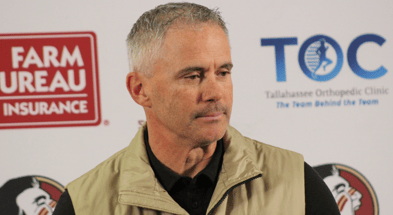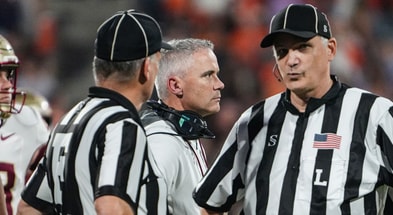Florida Attorney General Ashley Moody asks other states for support in FSU-ACC lawsuit

The Atlantic Coast Conference, which is already embroiled in lawsuits with marquee member schools Florida State and Clemson in three separate states, appears to have another powerful adversary waiting in the wings: Florida Attorney General Ashley Moody.
Two weeks after a North Carolina judge ruled the ACC’s lawsuit against FSU could move forward in Mecklenburg County Court, Moody sent a letter to the top legal officers in six states, asking them to stand with FSU in arguing the Seminoles should be protected from out-of-state legal action by sovereign immunity.
The letter was dated April 17, 2024, and addressed to California Attorney General Rob Bonta, Georgia Attorney General Christopher M. Carr, Kentucky Attorney General Russell Coleman, Pennsylvania Attorney General Michelle Henry, South Carolina Attorney General Alan Wilson, and Virginia Attorney General Jason Miyares.
“It is because of the potential breadth and impact of the trial court’s claimed waiver of sovereign immunity that I write to each of you,” Moody wrote in the two-page letter, which was obtained by Warchant late Monday. “The potential impact of the ACC Lawsuit could subject FSU to a loss of more than a half of a billion dollars. Any waiver of sovereign immunity, especially one of such a magnitude by a state entity, should require an especially clear waiver of its sovereign immunity.”
FSU and the ACC are suing each other in their respective states over the conference’s massive exit fees and long-term Grant of Rights agreement; Clemson is doing the same in South Carolina. If the ACC prevails, those schools could be required to pay well over $500 million if they want to leave the conference and join a different league.
In their motion to dismiss the ACC’s lawsuit, which was filed in late December, Florida State’s attorneys argued sovereign immunity protects the university from being sued in another state. Judge Louis A. Bledsoe denied that motion in a 76-page order and opinion dated April 4.
Because FSU has been active in “extensive commercial activity” in the state of North Carolina for years, Bledsoe wrote, the university has waived its right to be protected by sovereign immunity: “The ACC’s activities, specifically the sponsorship of athletic events and the marketing of media rights for those events, are commercial in nature. The Court further concludes that, as a Member of the ACC, FSU’s Conference-related activities in this State are also commercial, rather than governmental.”
Florida State is in the process of appealing that decision. Meanwhile, Moody’s letter to the six attorneys general appeared to be penned with three goals in mind.
Top 10
- 1New
Chandler Morris
Critical injury update in ACC
- 2Trending
James Franklin
Reportedly close to ACC job
- 3Hot
Nico Iamaleava
UCLA QB to miss OSU game
- 4
Marcus Freeman
Notre Dame HC blocks out noise
- 5
Best Bets
Josh Pate's 10 best bets
Get the Daily On3 Newsletter in your inbox every morning
By clicking "Subscribe to Newsletter", I agree to On3's Privacy Notice, Terms, and use of my personal information described therein.
No. 1: Alerting those states, each of which have universities in the ACC, that their schools could be subject to similar lawsuits in the future.
No. 2: Encouraging those legal officers to contact their ACC member schools and make them aware of the perils of the conference’s actions.
No. 3: Asking those states to consider joining the state of Florida in “taking action” to help FSU’s cause.
“I also understand that conference realignment has become contentious and is highly charged,” Moody wrote. “Each of our states has some university that will likely be significantly affected from the shakeout of the latest round of consolidation, and I recognize and appreciate that the fans for each school are extremely passionate. But, positions such as the waiver of sovereign immunity position being advanced by the ACC are detrimental to all of our states. If the history of college football realignment has taught us anything at this point, it is that there will be some future realignment down the road. The universities that have ratified such an expansive view of the waiver of sovereign immunity in the ACC Lawsuit may find that the sword that they now wield will be turned on them.”
Moody concluded her message with a call to action for the six attorneys general.
“If you see the same risks as I do in the ACC Lawsuit, I ask that you or your staff engage with your universities,” Moody wrote. “FSU is appealing the trial court’s decision in the ACC Lawsuit. Florida is considering taking action in that appeal. If you are interested in becoming involved in those efforts, please let me or my Chief Deputy, John Guard know.”
This is not the first time Moody has sought to get involved in Florida State’s ongoing battle with the ACC. In early January, she filed a request asking the conference to release several documents related to the dispute, including ESPN’s television contract with the ACC and the Grant of Rights, which is believed to tie each school’s media rights to the conference through 2036.

Here is the complete text of Moody’s letter, which also can be viewed in PDF format here:
Dear Attorneys General Bonta, Carr, Coleman, Henry, Miyares & Wilson:
I have attached to this letter an order that my office recently became aware of in the ACC Lawsuit referred to above. I would direct each of your attention to pages thirty-two through forty-two of that decision, where a trial court in the State of North Carolina concluded that Florida State University (“FSU”) waived its sovereign immunity to be sued in the State of North Carolina by belonging to the Atlantic Coast Conference (the “ACC”). All of you have public universities that are members of the ACC. You each have other higher education institutions that belong to similar unincorporated sports associations. Indeed, there are countless similar organizations at every level of our states and local governments to which state and local officers are involved. It is because of the potential breadth and impact of the trial court’s claimed waiver of sovereign immunity that I write to each of you.
The potential impact of the ACC Lawsuit could subject FSU to a loss of more than a half of a billion dollars. Any waiver of sovereign immunity, especially one of such a magnitude by a state entity, should require an especially clear waiver of its sovereign immunity. Indeed, settled law for more than fifty years suggested exactly that when it came to sovereign immunity. See Edelman v. Jordan, 415 U.S. 651, 673 (1974). In Edelman, the Supreme Court unambiguously stated that “[c]onstructive consent is not a doctrine commonly associated with the surrender of constitutional rights, and we see no place for it here. In deciding whether a State has waived its constitutional protection under the Eleventh Amendment, we will find waiver only where stated ‘by the most express language or by such overwhelming implications from the text as (will) leave no room for any other reasonable construction.”” Id. (citations omitted) (emphasis added).
Except for Clemson University, it appears that public institutions from each of your states (other than South Carolina) voted for the filing of the ACC Lawsuit in North Carolina. I am sure that those involved in that decision did not consult with you or likely even your office. For all I know, the ACC or its lawyers may have not even explained the future implications of their act or the ramifications that could flow to those institutions if that position was adopted by a court. I also understand that conference realignment has become contentious and is highly charged. Each of our states has some university that will likely be significantly affected from the shakeout of the latest round of consolidation, and I recognize and appreciate that the fans for each school are extremely passionate. But, positions such as the waiver of sovereign immunity position being advanced by the ACC are detrimental to all of our states. If the history of college football realignment has taught us anything at this point, it is that there will be some future realignment down the road. The universities that have ratified such an expansive view of the waiver of sovereign immunity in the ACC Lawsuit may find that the sword that they now wield will be turned on them. More than that, those schools may find that their future decisions and actions are now subject to resolution in some other state than where they are located based on their position in this suit. Finally, if being member of an association and participating in meetings waives sovereign immunity, then sovereign immunity, as contained in the U.S. Constitution, our state constitutions, and our state statutes may not be the protection that we all have believed that it is.
If you see the same risks as I do in the ACC Lawsuit, I ask that you or your staff engage with your universities. FSU is appealing the trial court’s decision in the ACC Lawsuit. Florida is considering taking action in that appeal. If you are interested in becoming involved in those efforts, please let me or my Chief Deputy, John Guard know. John’s telephone number is 850-544-8303.
Sincerely,
Ashley Moody
Florida Attorney General
Talk about this story with other die-hard Florida State football fans on the Tribal Council.
























